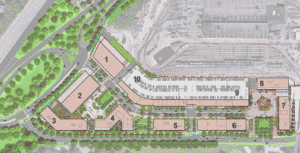Mark Development’s proposal to add life science uses to its 1 million-square-foot Riverside development will be one of the first tests of Massachusetts’ three-month-old Housing Choice law which offers lower hurdles to rezone properties that create new housing.
The Newton City Council’s land use committee will hold a public hearing Tuesday on the latest changes to the project, slated to be built on 13 acres at the former Hotel Indigo property and an MBTA-owned parking lot.
After years of debate, Wellesley-based Mark Development obtained final approval in October for the mixed-use project including a hotel, apartments, offices and retail space.
But amid rapid changes in the commercial real estate market since the onset of the pandemic and the implications of the Housing Choice law, Mark Development is seeking to drop the hotel in favor of 362,235 square feet of lab space in two buildings, while eliminating all but 7,500 square feet of office space slated to be used by the MBTA.
This time, a simple majority of the 24-member council will be sufficient to approve the changes, according to an opinion rendered by Assistant City Solicitor Jonah Temple.
“The legislative intent behind the Zoning Act’s revised voting thresholds is clear: to encourage new housing production through the development of multi-family and mixed-use projects,” Temple wrote in a memorandum to the city council.
The housing choice bill was approved by state lawmakers and signed by Gov. Charlie Baker in January. Amid other provisions, it sought to increase housing production by lowering the threshold to rezone some properties to a simple majority vote of a community’s legislative body, instead of the previous two-thirds threshold. The new standard applies to both multifamily projects and zone changes that increase density of mixed-use developments.
Along with the hotel-to-labs switch, Mark Development is seeking to reduce retail and commercial space from 39,014 to 21,981 square feet and reduce the apartment count from 582 to 550.
The Mark Development proposal meets the criteria because it would increase the height of eight buildings, increase the intensity of the lab use and add senior housing to the list of allowable uses, Temple’s memo states.
Because the law is only three months old, such legal questions have yet to be tested in court.
“Understandably, there are no Massachusetts judicial decisions that address any of these issues. While various state departments have issued basic guidance, they provide limited assistance,” he wrote.









